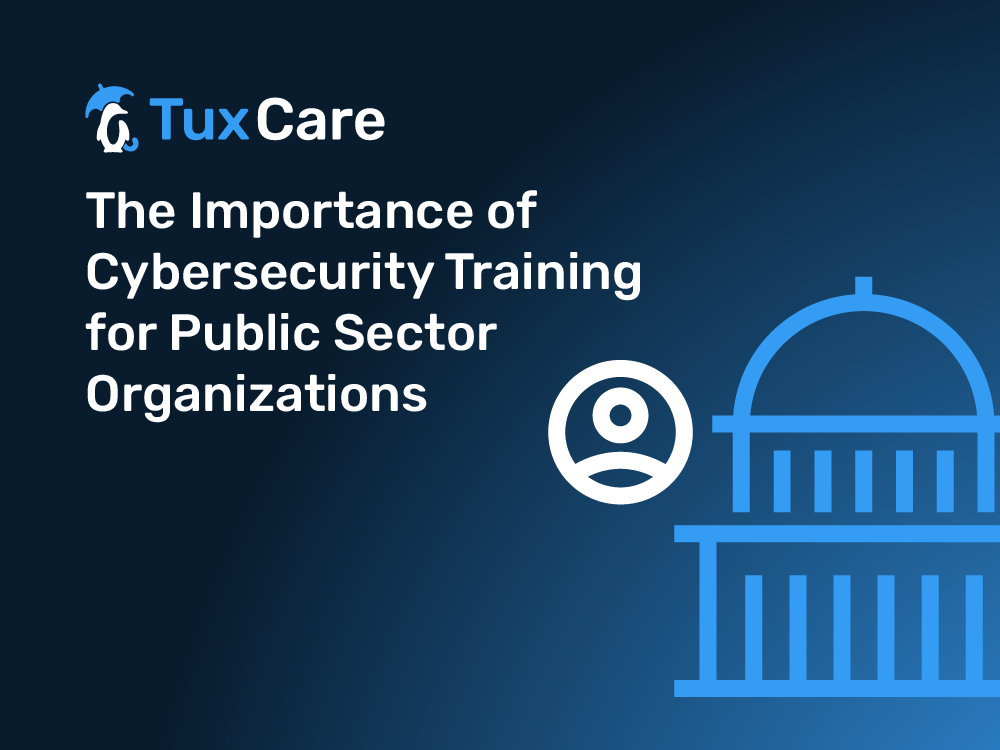The Importance of Cybersecurity Training for Public Sector Organizations
Cybersecurity threats are ever present and government organizations face unique challenges in securing the sensitive information of citizens. As workers with limited technology training become increasingly susceptible to threat actors, the need for comprehensive cybersecurity education has never been greater.
In this article, we discuss why cybersecurity education matters to government organizations and how training can be a powerful way to empower employees as a first line of defense against cyberattacks.
A Need for Cybersecurity Education in Government
In a government organization where employees may have had less IT training over their lifetimes – or where employees had limited interaction with IT staff – various cybersecurity risks are heightened simply because employees were less exposed to the rough and tumble of the technology environment. These cybersecurity risks include:
- Phishing attacks: Untrained employees can more easily fall victim to phishing emails that appear to be from legitimate sources but are designed to steal sensitive information, such as login credentials or financial details.
- Social engineering: Cybercriminals often use social engineering tactics to manipulate employees. Employees with limited IT knowledge may be more susceptible to these tactics, putting the organization at risk.
- Improper handling of sensitive data: Employees without proper training might mishandle sensitive information, which can lead to data leaks and breaches.
- Installing unauthorized software: Less savvy employees could install unauthorized software, browser extensions, or mobile apps without understanding the potential security risks – which, in turn, may introduce malware or create vulnerabilities within the organization’s network.
These potentially devastating events underscore the importance of providing regular and comprehensive cybersecurity training to government employees, regardless of their IT proficiency.
What Do We Mean by Cybersecurity Education?
Cybersecurity education for end-users refers to a training program or an awareness initiative aimed at teaching employees about the importance of protecting sensitive information, maintaining secure digital environments, and adhering to best practices to prevent cyber threats.
The objective of cybersecurity education is to empower end-users to become the first line of defense against potential cyberattacks and to safeguard the organization’s information assets.
It requires evaluating a department’s current cybersecurity posture and identifying areas of improvement, alongside the specific cybersecurity topics and skills required for various roles within the department.
Education programs could be formal – a day’s training for example – or based on reinforcement, through regular reminders. Either way, easy-to-understand training materials, such as presentations, handouts, and guides, can help break down complex cybersecurity concepts into simple, manageable steps.
Benefits of Cybersecurity Education
Education programs are intended to go head-on against the most common cybersecurity threats, but it’s best to start with building a culture of security.
By teaching employees about the importance of security and how to protect sensitive information, security awareness training can help create a security-conscious culture within an organization, which can help people absorb the lessons to come. Once these lessons settle in, government departments should see that cybersecurity training helps to:
- Prevent data breaches and phishing attacks: Security awareness training helps employees identify and avoid phishing attacks and social engineering, which can prevent data breaches as attackers would need to find a different way in.
- Make defenses against cyber threats more robust: By teaching employees how to identify and report security incidents, security awareness training helps ensure that IT teams respond more quickly and effectively to cyber threats.
- Give users of government services confidence: Security awareness training can help give ordinary citizens assuredness that their sensitive information is being protected.
Security awareness training also helps government organizations meet compliance requirements, such as NIST, FISMA, and FEDRAMP. In fact, many of these regulations require organizations to provide security awareness training to their employees anyway.
Education Is Only One Line of Defense
Effective cybersecurity is, however, multilayered – and security teams need to work from all sides. As a quick review, we suggest that government organizations consider the following:
- Requiring Strong Passwords and Authentication: Passwords are a critical line of defense against cyberattacks. Government organizations should make sure that their employees use strong passwords, change them regularly, and use multi-factor authentication to add an extra layer of security.
- Network Segmentation: Network segmentation involves dividing a computer network into smaller subnetworks to reduce the impact of a breach. Government organizations should segment their networks into smaller parts and restrict access to critical systems.
- Regular Updates and Patches: Cybercriminals often exploit vulnerabilities in software to gain access to systems. Government organizations should ensure that their systems are regularly updated with the latest security patches and software updates.
The right toolset matters, but rapidly responding is important too. Government organizations should constantly monitor their networks for suspicious activity and conduct regular analyses to identify potential vulnerabilities and threats – and to catch intruders in the act.
Train Workers – But Apply Other Cybersecurity Principles Too
Overall, cybersecurity training can be incredibly effective as a first line of defense. For the most part, it simply fits into workers’ everyday lives (as long as they’re trained) and there’s little friction or cost to applying it in practice.
Indeed, cybersecurity training can boost the effectiveness of existing tools by ensuring that hackers can’t circumnavigate standard security measures through social engineering, for example. But governments need to apply the entire toolset as well.
As far as patching goes, we encourage you to review how TuxCare can help government organizations meet their patching and security goals by implementing a live patching regime.
Live patching enables organizations, including public sector ones, to automatically deploy the latest patches as soon as they become available – while avoiding downtime, end-user disruptions, and planned maintenance windows.



 Documentation
Documentation Login
Login



